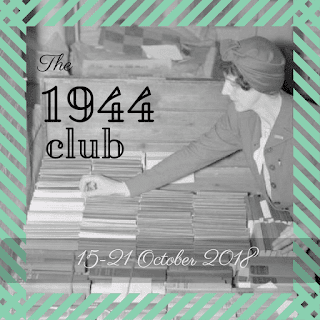Thank you, #1944Club, for getting me to finally read John Hersey's A Bell For Adano, which has been loitering on my TBR pile for who knows how long. What fun!
A Bell For Adano is the story of Major Joppolo, an Italian-American who's put in charge of Adano, an imaginary town in Sicily, from the first days of Operation Husky, the Allied invasion of Sicily in 1943.
 You can imagine the sort of problems Joppolo faces in trying to sort out a town in the immediate aftermath of its liberation, but there are two in particular that bedevil Joppolo. The first is the bell of the city hall that rang until just weeks before the invasion; it was the spirit of the city; the Fascists sent it off to be melted down for munitions. It needs to be recovered, or something needs to replace it. The other is the American General Marvin, the villain of the novel, who, in a fit of anger at a traffic jam, shoots a mule and orders all carts off the streets of Adano. But Adano is a poor town, with no well; it depends on carts to bring in water as well as its other supplies. Joppolo will need to fix this. These two tasks drive the plot and come together for its resolution.
You can imagine the sort of problems Joppolo faces in trying to sort out a town in the immediate aftermath of its liberation, but there are two in particular that bedevil Joppolo. The first is the bell of the city hall that rang until just weeks before the invasion; it was the spirit of the city; the Fascists sent it off to be melted down for munitions. It needs to be recovered, or something needs to replace it. The other is the American General Marvin, the villain of the novel, who, in a fit of anger at a traffic jam, shoots a mule and orders all carts off the streets of Adano. But Adano is a poor town, with no well; it depends on carts to bring in water as well as its other supplies. Joppolo will need to fix this. These two tasks drive the plot and come together for its resolution.
This is Hersey's first novel, though he had been a reporter for Time magazine and written two books of World War 2 reportage before this. He was embedded with American troops as they came into Sicily. He's got a pleasant spare style, both humorous and touching:
Father Pensovecchio could not remember when so many people had come to the Church of San Angelo.
Perhaps he had not been without guile when he had mentioned to ten or twelve people, quite casually, that the American Major would be in Church in the morning, and that he himself had something to say about the Americans. What priest does not like to have many listeners?Well, Joppolo is a good man in a difficult situation, fighting American ignorance and disdain, bureaucratic disregard and logrolling, not to mention the occasional actual leftover Fascist. His tale is engaging, sweet, but not too sweet. Recommended.
And if it's just a little self-congratulatory, well, that helped it to go on and win the Pulitzer for fiction in 1945, and it may also be the U. S., in comparison to every other war fought since then, could be allowed a little self-congratulation. Especially in the matter of the government they provided for occupation.
I didn't read the handsome reissue shown above, but the rather beat-up copy shown in my pile o' 1944 books:
But it does seem to actually date from the period (not sure anymore where I found the book). But this is on the inside cover:



Thanks for joining in! I'm glad this one was such a success :)
ReplyDeleteIt was! And not just for knocking off those endless TBR books...
Delete